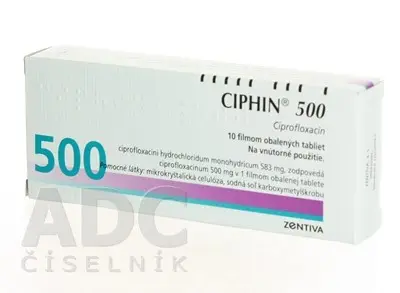Contents
Ciphin is a systemic antibacterial drug. A chemotherapeutic agent used in the treatment of bacterial infections, especially infections with Gram-negative bacteria. The active substance is ciprofloxacin. Ciphin in a pharmacy is available on prescription.
Ciphin, Producer: Zentiva
| form, dose, packaging | availability category | the active substance |
| coated tablets; 500 mg; 10 tablets | prescription drug | ciprofloxacin |
Ciphin indications for use
Ciphin indications: treatment of infections caused by aerobic bacteria resistant to other antibiotics, such as:
- genitourinary tract infections (including gonorrhea),
- respiratory tract infections (including throat, nose and ears)
- abdominal infections (including peritonitis, sepsis)
- eye infections
- bone, joint and soft tissue infections,
- the prevention of infections in immunocompromised patients, especially in the setting of neutropenia.
Ciphin and contraindications
Ciphin contraindications: hypersensitivity to any component of the preparation or to other quinolines, parallel use of tizanidine (Sirdalud, Sirdalud MR). Do not use the preparation during pregnancy and breastfeeding.
Dosage
Adults with normal kidney function:
- The maximum dose is 1,5 g / day.
- Bone and joint infections, pneumonia, skin and soft tissue infections: 250-750 mg administered twice daily for 2-7 days. In bone and joint infections, the duration of treatment is 14-4 weeks, up to a maximum of 6 months.
- Infections of the gastrointestinal tract: 500 mg every 12 hours for 5-7 days.
- Acute gonorrhea and acute uncomplicated cystitis: single dose of 250 mg.
- Infections of the kidneys and urinary tract: light and moderately severe 250-500 mg every 12 hours. for 7-14 days.
Adults with kidney problems:
- the doctor will prescribe the dose depending on the degree of renal failure: If the creatinine clearance is higher than 50 ml / min, no dosage adjustment is necessary. If it is in the range of 30-50 ml / min, the usual dose is 250-500 mg every 12 hours, if it is less than 30 but does not fall below 5 ml / min, the usual dose is 250-500 mg every 18 hours. In patients undergoing dialysis, the usual dose is 250-500 mg every 24 hours. (after dialysis).
- In elderly patients the usual dose is lower by 1/3.
Ciphin tablets should be swallowed whole, without chewing, washed down with water. Can be taken with or without food. Do not use with dairy products (milk, yoghurt) or with fruit juices enriched with minerals (e.g. orange juice with added calcium).
Ciphin – warnings
- Ciphin is not recommended for the treatment of streptococcal infections of the respiratory tract, and urogenital and pelvic infections caused by those Neisseria gonorrhoeae strains that are not susceptible to ciprofloxacin.
- In children and adolescents, ciprofloxacin may damage the joints.
- Due to the lack of data, the use of Ciphin in the treatment of cystic fibrosis in children under 6 years of age is not recommended.
- People with kidney problems should adjust the dose of Ciphin with their doctor.
- Necrosis may occur in patients with hepatic insufficiency.
- Treatment should be discontinued at the appearance of any symptoms suggestive of liver dysfunction: anorexia, jaundice, dark urine, itching or tenderness of the abdomen.
- Ciphin may delay your reaction time so much that you cannot drive or operate machinery.
- Pregnant women should not take the drug.
- The use of the drug is contraindicated in breastfeeding women.
- Caution is advised in diabetic patients, especially in the elderly, due to the possibility of hypoglycaemia (low blood sugar) during the use of the preparation.
Other Drugs and Ciphin
When using Ciphin, inform your doctor about all medications you are taking (even over-the-counter medications), in particular:
- drugs that prolong the QT interval,
- medicines containing multivalent cations, orally or minerals,
- dairy products or mineral-fortified drinks (e.g. milk, yoghurt, calcium-fortified orange juice)
- caffeine and pentoxifylline, ropiniol, clozapine, due to the increase in their concentration in the blood, your doctor will monitor the concentration of the concurrent drug,
- phenytoin,
- cyclosporins,
- vitamin K antagonists (e.g. warfarin, acenocoumarol, phenprocoumon, fluindione),
- duloxetine and strong inhibitors of the isozyme CYP450 1A2 such as fluvoxamine,
- hide it,
- sildenaflu,
- probenecid,
- metoclopramide, as it induces an earlier onset of action of ciprofloxacin
- omeprazole (slight weakening of the effect of the preparation),
- teofiliny.
Ciphin – side effects
Ciphin can cause side effects such as: Musculoskeletal pain (e.g. back pain, pain in extremity, chest pain), arthralgia, renal dysfunction, weakness, fever, increase in blood alkaline phosphatase, antibiotic-related colitis (very rarely life-threatening), leukopenia, anemia, neutropenia, leukocytosis, thrombocytopenia, fungal superinfections, eosinophilia, decreased appetite, psychomotor hyperactivity, agitation, headache, dizziness, sleep disturbances, taste disturbances, vomiting, abdominal pain, stomach and intestinal pain, indigestion, flatulence.










